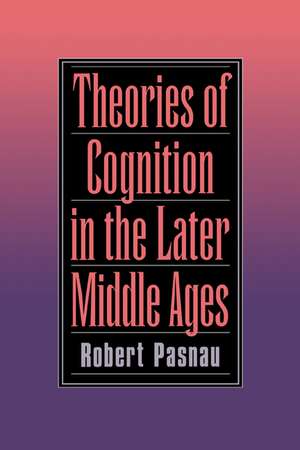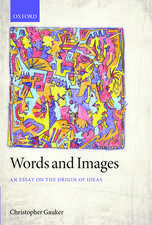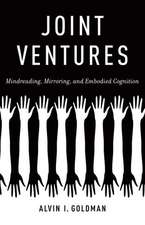Theories of Cognition in the Later Middle Ages
Autor Robert Pasnauen Limba Engleză Hardback – 27 mai 1997
Preț: 698.50 lei
Preț vechi: 784.83 lei
-11% Nou
Puncte Express: 1048
Preț estimativ în valută:
133.65€ • 140.05$ • 110.49£
133.65€ • 140.05$ • 110.49£
Carte tipărită la comandă
Livrare economică 12-26 aprilie
Preluare comenzi: 021 569.72.76
Specificații
ISBN-13: 9780521583688
ISBN-10: 0521583683
Pagini: 348
Dimensiuni: 159 x 236 x 26 mm
Greutate: 0.64 kg
Ediția:New.
Editura: Cambridge University Press
Colecția Cambridge University Press
Locul publicării:New York, United States
ISBN-10: 0521583683
Pagini: 348
Dimensiuni: 159 x 236 x 26 mm
Greutate: 0.64 kg
Ediția:New.
Editura: Cambridge University Press
Colecția Cambridge University Press
Locul publicării:New York, United States
Cuprins
Introduction; Part I. Fudamentals: 1. Immateriality and Intentionality; 2. Intentionality made mysterious; 3. Form and representation; 4. Passivity and attention; Part II. Representations and realism: 5. Are species superfluous? 6. Aquinas and direct realism; 7. The veil of the species; 8. Word and concept.
Recenzii
"This is a...sophisticated piece of work,...which well repays the effort put into reading it. Pasnau's knowledge of his subject is deep, and he leads his reader carefully through the same paths as he has taken to achieve this understanding. he brings out well the importance of medieval accounts and their similarities to modern ones.... Highly recommended." Richarrd Cross, Int'l Philosophical Qtrly
"...a lively contribution to a philosophical way of discussing thinkers in the Later Middle Ages. This book nicely shows the rationale of the history of Western philosophy continuing as it has." Richard Bosley, Philosophy in Review
"Robert Pasnau's book is a welcome addition to the sparse literature on medieval philosophy of cognition." Simon Kemp, Journal of the History of the Behavioral Sciences
"Pasnau has written a fascinating, provocative book that should be read by anyone who is interested in medieval philosophy of mind and epistemology." The Philosophical Review
"...important and challenging...Pasnau handles his materials, including his own translations, deftly and with philosophical ingenuity. His book is very important, challenging, and should be read by anyone who has an interst in philosophical theories of cognition. He succeeds in leading 'a new historical perspective to contemporary thinking about the mind and knowledge.'" Journal of the History of the Neurosciences
"...a lively contribution to a philosophical way of discussing thinkers in the Later Middle Ages. This book nicely shows the rationale of the history of Western philosophy continuing as it has." Richard Bosley, Philosophy in Review
"Robert Pasnau's book is a welcome addition to the sparse literature on medieval philosophy of cognition." Simon Kemp, Journal of the History of the Behavioral Sciences
"Pasnau has written a fascinating, provocative book that should be read by anyone who is interested in medieval philosophy of mind and epistemology." The Philosophical Review
"...important and challenging...Pasnau handles his materials, including his own translations, deftly and with philosophical ingenuity. His book is very important, challenging, and should be read by anyone who has an interst in philosophical theories of cognition. He succeeds in leading 'a new historical perspective to contemporary thinking about the mind and knowledge.'" Journal of the History of the Neurosciences
Descriere
A major contribution to the history of philosophy in the later medieval period (1250–1350).












